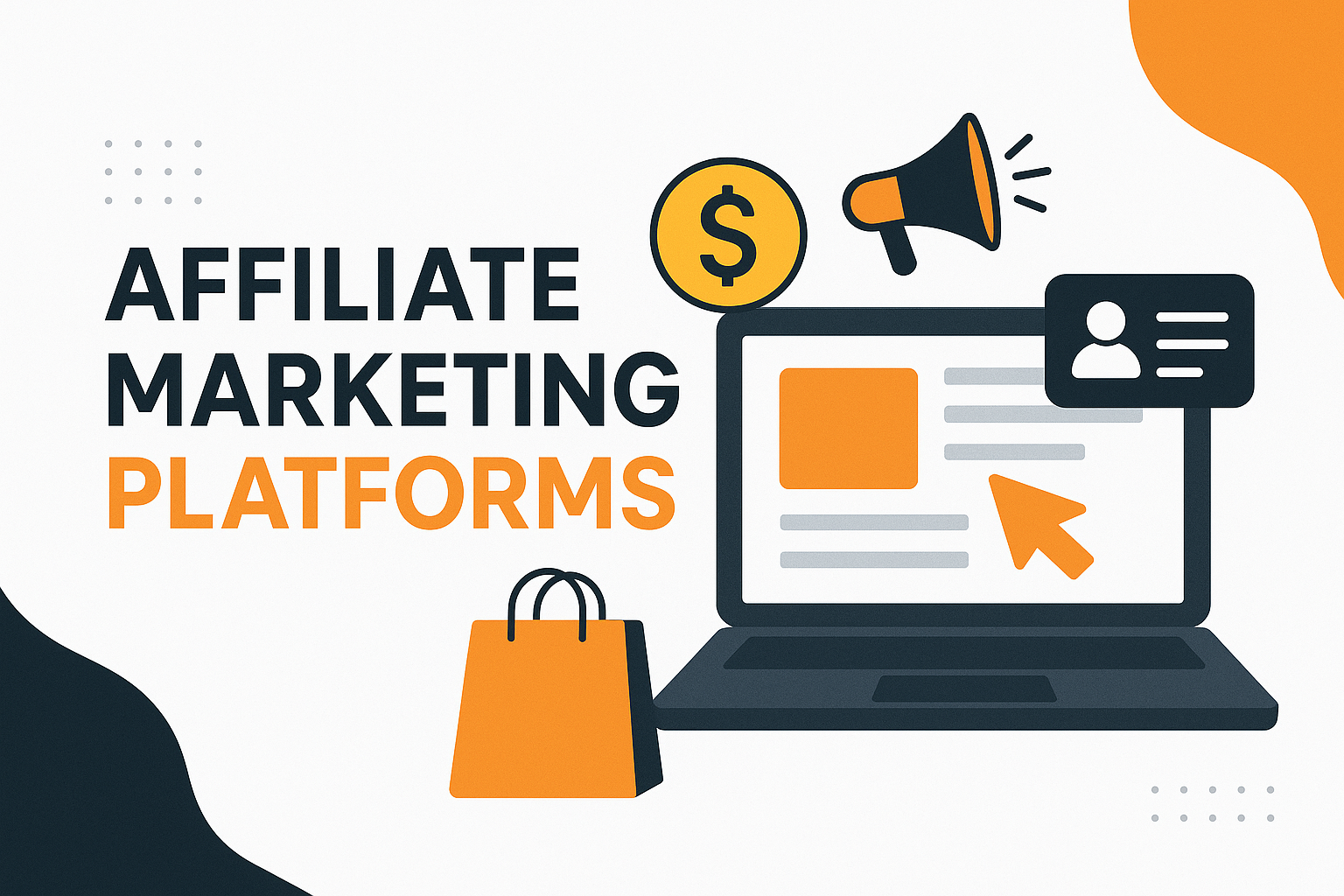Top Affiliate Marketing Platforms for Businesses and Affiliates in 2025
Key Takeaways
-
Affiliate marketing platforms link businesses with affiliates, streamline campaign management, track performance, and process payments.
-
Selecting the right platform involves examining features such as tracking reliability, reporting dashboards, integration options, and payment mechanisms.
-
Business gains broader affiliate networks, simplified onboarding, and access to resources that help grow and optimize campaigns.
-
Effective communication channels and continued support are critical to fostering healthy, efficient business and affiliate relationships.
-
Dealing with possible issues such as data discrepancies, fraud, and regulatory compliance can assist in keeping trust and protecting both parties.
-
Consistent monitoring, tuning, and relationship building are essential to driving the most results and sustaining affiliate marketing success over time.
Affiliate marketing platforms allow brands and creators to discover and manage performance-based partnerships. These platforms provide resources for tracking, reporting, and paying.
Agencies, small teams, and solo marketers piggyback on these systems to expand reach and increase sales more affordably. Some platforms specialize in specific products or geographic niches, while others have broad coverage.
The following sections discuss what to look for and compare leading choices.
What are Affiliate Marketing Platforms?

Affiliate marketing platforms are software programs that bridge the gap between businesses and affiliates. These tools assist advertisers in running campaigns, monitoring affiliate activities, and managing payments. They provide one place to manage your campaigns, eliminating the clutter of multiple different tools.
As the affiliate marketing industry continues to expand, projected to reach $13 billion by 2026, these platforms offer an obvious opportunity to acquire new customers with less risk and lower costs than many other digital channels.
1. The Digital Handshake

Affiliate marketing platforms begin by establishing deals between brands and affiliates. These contracts utilize online contracts, streamlining the process for all parties. Well-defined terms and conditions establish what each party expects, creating trust out of the gate.
These platforms typically allow you to build affiliate links immediately. This implies each click, sale, or sign-up can be monitored. With all things digital, bringing new affiliates on board is easy and fast.
2. The Technology Bridge
Tracking and reporting tech is the backbone of any affiliate platform. Platforms employ cookies, pixels, and dashboards to display performance in real time. Integration with other marketing tools, like email or analytics software, can help teams extract more value from their campaigns.

Certain platforms have intuitive interfaces, allowing users to create custom links or campaigns within minutes. APIs are crucial in this regard. They enable platforms to integrate with other tools, allowing agencies and SaaS purchasers to view all of their data in a single location.
3. The Financial Clearinghouse
Handling payments and commissions is a large part of what these platforms handle. Affiliates want to be paid on time, and brands need a transparent view into what they owe. Most platforms host various commission types, including CPA, revenue share, or flat fees.

Payment schedules are typically established, so affiliates understand when they will receive compensation. Transparency is baked in, with transparent ledgers so both sides can view each transaction.
4. The Central Hub
Since all campaign data lives in one spot, management is simpler for teams. Dashboards provide a comprehensive overview of affiliate performance. This saves time and reduces errors.

Communication tools enable advertisers and affiliates to communicate in one centralized location, which reduces lost messages or confusion. Having it all together helps teams work faster and smarter.
5. The Trust Broker
Affiliate platforms simplify work for brands and affiliates alike. They assist growth by simplifying the process of discovering and recruiting new partners. Great platforms provide resources and support to help affiliates scale.

With improved data insights and intelligent partnerships, advertisers can increase their ROI. Data laws such as GDPR and CCPA are baked in, so you all remain compliant.
Top Affiliate Marketing Platforms in 2025
Affiliate marketing continues to evolve fast, and 2025 is all about smarter tracking, AI-driven optimization, and creator-led partnerships. Whether you’re a brand looking to boost sales or a creator hoping to monetize your reach, the right platform can make all the difference.
Here are some of the best affiliate marketing platforms in 2025:
1. ShareASale

A long-standing favorite in the affiliate world, ShareASale connects over 30,000 merchants with affiliates in nearly every niche imaginable. It’s easy to use, transparent, and offers strong tracking tools — perfect for both beginners and established marketers.
It’s mostly best for variety and easy program discovery.
2. CJ Affiliate (Commission Junction)

CJ Affiliate remains one of the most reputable networks globally. Known for its robust analytics, real-time reporting, and partnerships with top brands, it’s ideal for serious affiliates and enterprise-level campaigns.
3. Awin

Operating in over 180 countries, Awin is a powerhouse in global affiliate marketing. It offers excellent cross-border support, flexible payment options, and deep insight reporting — a great choice for brands expanding internationally.
4. Impact

Impact (formerly Impact Radius) is built for customization and automation. With its advanced analytics, smart partnerships, and flexible commission models, Impact allows businesses to create personalized affiliate experiences at scale.
This platform is best for brands and agencies needing advanced integration.
5. MaxBounty

If your focus is CPA marketing (cost-per-action), MaxBounty is among the best. It connects affiliates with high-converting offers across industries like finance, health, and e-commerce. Fast payouts and strong account management make it a favorite among performance marketers.
6. Rakuten Advertising

Formerly Rakuten Marketing, this platform is trusted by big brands worldwide. It’s known for its premium partnerships, intuitive dashboard, and multi-channel support. Rakuten focuses on building long-term, high-quality relationships between advertisers and publishers.
7. TikTok Affiliate Program

TikTok isn’t a traditional affiliate network, but it’s fast becoming a major player in this space. Its creator-affiliate ecosystem lets influencers promote products through videos and earn commissions directly. With TikTok Shop and affiliate integrations expanding globally, it’s a game-changer for social-led affiliate marketing.
This is best for influencers and brands leveraging short-form video.
8. ClickBank

ClickBank remains a top pick for affiliates focusing on digital products like courses, software, and e-books. It’s beginner-friendly, has a low entry barrier, and provides detailed sales analytics.
Affiliate marketing in 2025 is no longer just about links and commissions — it’s about data, personalization, and trust. Whether you go with a global network like CJ Affiliate or dive into TikTok’s creator-driven model, the key is choosing a platform that aligns with your goals and audience.

Choosing Your Platform
It’s not all about features when it comes to choosing your affiliate marketing platform. It’s about choosing your platform based on how it fits business goals, product type, and growth plans. Making your platform choice consistent with your marketing strategy not only helps you maximize your results but also establishes a foundation for long-term success.
Product fit, scalability, and the ability to set and track performance metrics all go a long way toward making the right choice.
Business Goals
All businesses must align their affiliate platform with their primary goals. Begin with your objective—are you seeking increased sales, new leads, or expanded brand awareness? This will help steer the selection of a platform that aligns with these goals.

Commission rates are important, but so are conversion rates and actual product demand. Certain platforms have high commissions, but if sales volume is low, the ROI is not as expected. Look out for hidden fees, too—like set-up fees, premium reporting, or withdrawal fees.
Cost Structure
Cost structure is more than the obvious fees. Make sure to find out if there’s a fee to join, a monthly minimum, or a fee to access in-depth stats. Subscriptions are nice and predictable, while commissions tie the platform cost to performance.
Seek out platforms with open rates and open documentation. The payment threshold can influence cash flow, particularly for smaller entities. Flexible payments, such as PayPal, direct deposit, wire transfer, or check, add ease for international partners.

Evaluate platform ROI, not only for upfront and ongoing costs, but for projected revenue.
Network Quality
Both a platform’s reputation and the quality of its affiliates can make or break campaign success. Beyond that, vast networks provide entry into various marketplaces and potential audiences. Check out the affiliate stats and look for success stories.
Platforms with active support, including affiliate managers, open forums, and rapid response times, are best equipped to assist if problems arise. The approval process can impact speed to launch, with certain networks requiring longer review and approval periods.
Key Features

Good affiliate marketing platforms have:
-
Good tracking
-
Nice reporting dashboards
-
Easy payment options
Affiliate tools need to provide transparent snapshots of which affiliates push sales and what campaigns perform best.
Real-time metric dashboards empower your teams to quickly make decisions and pivot strategies. Seamless payments, fast, flexible, and global, keep affiliates happy and engaged.
Always verify whether the platform discloses its contract terms, including commission rates, payment timelines, and cookie length.
Conclusion
Affiliate marketing platforms assist teams and brands to work smarter, rather than harder. They make it easy to track sales, identify best partners, and reward. Great platforms solve pain points such as lost leads or slow payments. They eliminate the guesswork by displaying obvious outcomes. For instance, small shops can identify which links perform, or large brands can monitor dozens of partners simultaneously. Certainly, no tech is perfect, but the right one can save time and hassle.
To get the most out of your affiliate program, choose tools that align with your goals and budget. And if you want a smarter way to visualize affiliate results or create real-time performance dashboards, try KPI.me. It’s an AI-powered dashboard generator that transforms your data into actionable insights—so you can monitor what matters most without the spreadsheets or setup stress.
Frequently Asked Questions
What is an affiliate marketing platform?
An affiliate marketing platform is a bridge between businesses and affiliates. It simplifies and streamlines affiliate marketing for both sides by managing partnerships, sales tracking, and payments.
Why should I use an affiliate marketing platform?
A platform saves time, boosts accuracy, and provides valuable analytics. It automates tracking, reporting, and payments, helping you scale your affiliate marketing program easily and securely.
What features should I look for in an affiliate marketing platform?
Seek trusted tracking, seamless payments, global support and powerful analytics. You’ll want a convenient dashboard and solid security features.
How do affiliate marketing platforms track sales?
Platforms utilize tracking links or codes to track clicks, conversions, and sales. These tools offer real-time reporting, allowing you to understand the affiliates that convert and optimize campaigns.
Are affiliate marketing platforms suitable for beginners?
Yep, pretty much all the platforms are fairly easy to use. They usually provide tutorials and assistance, so it’s simple for novices to launch and run affiliate platforms without much technical expertise.
Can affiliate marketing platforms help with international sales?
Yup, a lot of platforms are multi-currency and multi-lingual. This simplifies managing worldwide affiliates and monitoring sales in metric measured nations.
What are common challenges with affiliate marketing platforms?
Concerns are that setup can be difficult, integrating with your existing tools is challenging, and there is a risk of tracking errors. Frequent updates and selecting a trustworthy platform minimize these problems and provide a seamless experience.


